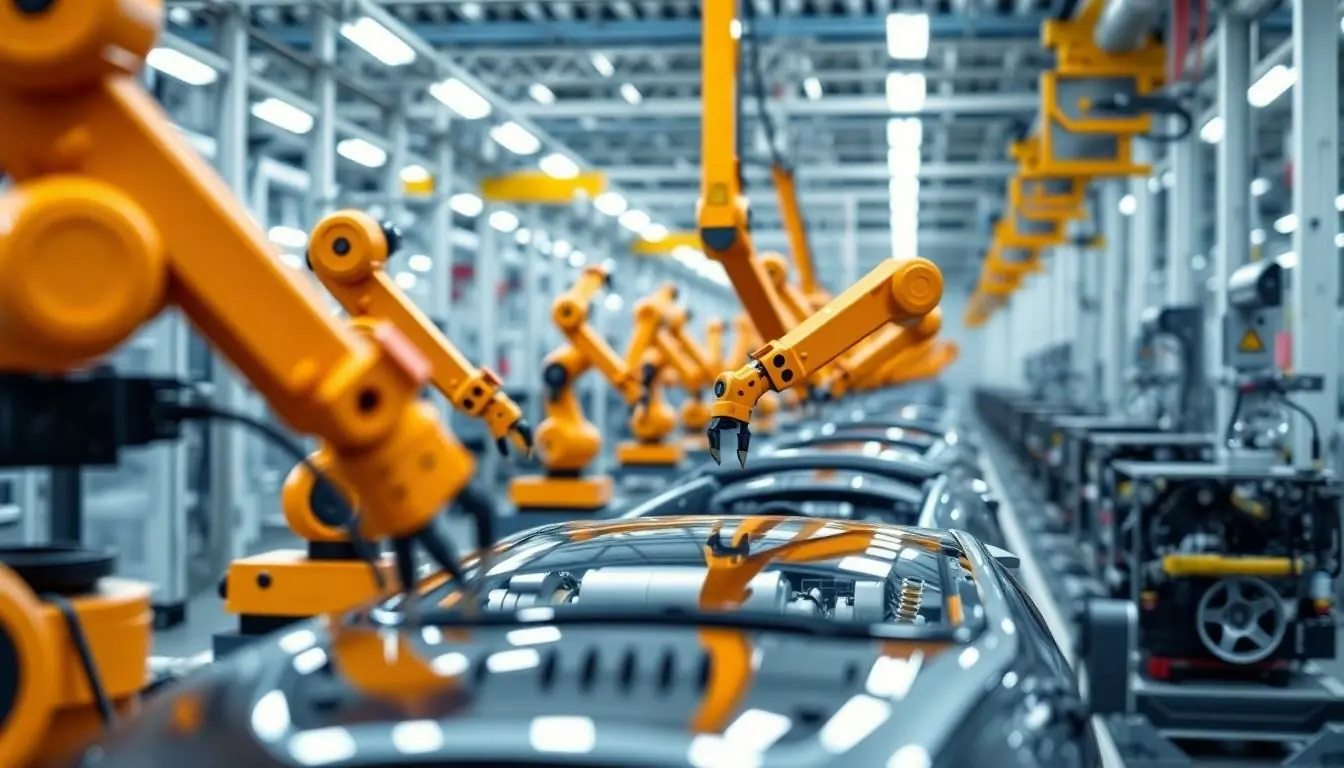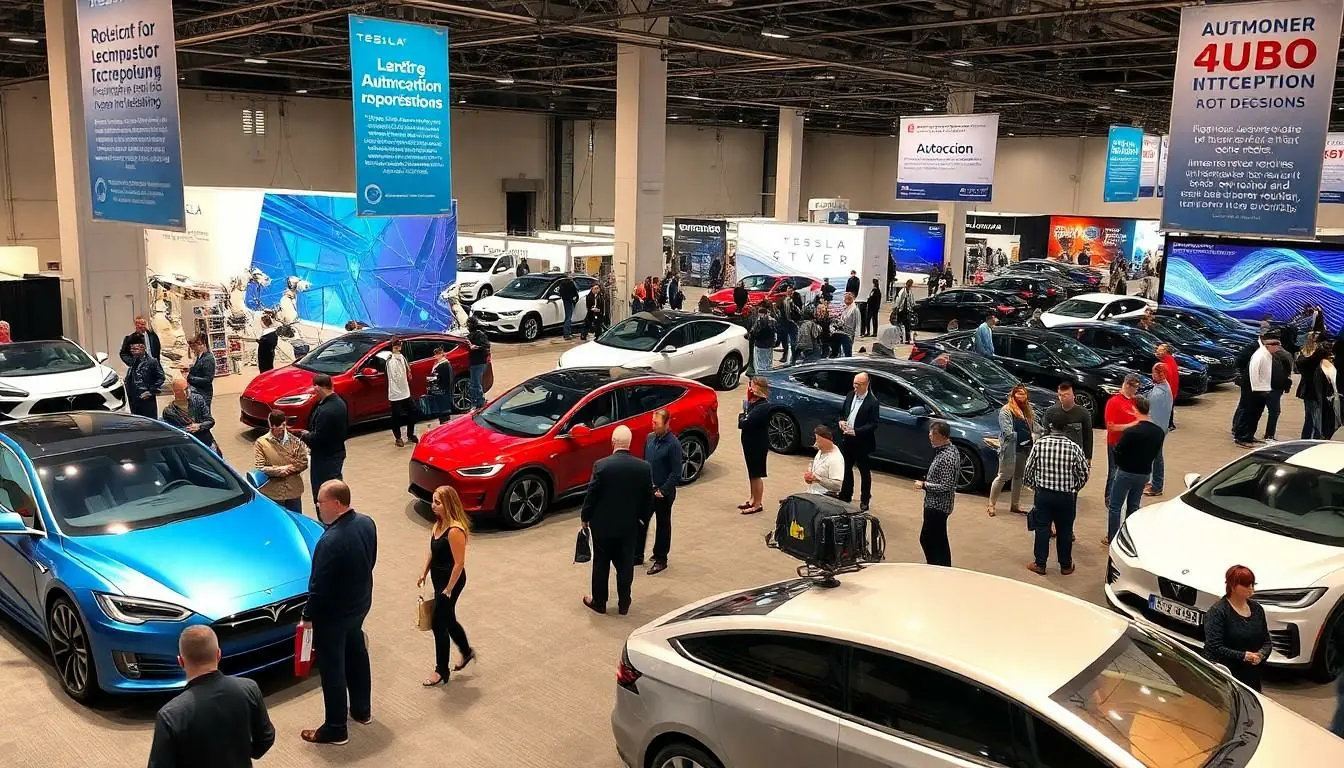Table of Contents
ToggleIn a world where cars can practically drive themselves and engines purr like kittens, staying updated on automotive technology news is more crucial than ever. Whether it’s the latest electric vehicle that promises to outlast your morning coffee or a quirky gadget that transforms your ride into a mobile disco, the automotive landscape is changing faster than you can say “check engine light.”
Latest Trends in Automotive Technology News
Staying informed about automotive technology developments proves essential as innovations reshape the industry. The latest trends highlight significant advancements in electric vehicles and autonomous driving.
Electric Vehicle Advancements
Electric vehicles (EVs) showcase rapid advancements, with improvements in battery technology leading to increased range and faster charging times. Companies like Tesla and Rivian are at the forefront, offering innovative models that challenge traditional combustion engines. The decrease in battery costs encourages consumers to shift toward EVs, contributing to a surge in sales. Government incentives and stricter emissions regulations further stimulate interest in electric alternatives. Automakers are also investing in charging infrastructure, enhancing the convenience of owning an electric vehicle. In 2023, the global EV market is projected to grow by over 20%, illustrating substantial consumer demand for sustainable transportation options.
Autonomous Driving Innovations
Autonomous driving is advancing at an unprecedented pace, attracting significant attention from tech firms and automakers. Companies such as Waymo and Cruise implement advanced sensor technology and artificial intelligence to improve vehicle navigation and safety. Levels of automation range from driver assistance systems to fully autonomous capabilities. Regulations and testing frameworks are evolving to keep pace with these innovations, ensuring safer deployment on public roads. In 2023, a notable increase in self-driving vehicle pilots occurred across various cities, reflecting growing confidence in this technology. Collaboration between automotive and tech industries enhances the development of autonomous systems, paving the way for widespread integration in the coming years.
Impact of Technology on the Automotive Industry

Technology significantly influences the automotive industry. Innovations reshape how manufacturers create vehicles and how consumers interact with them.
Changes in Manufacturing Processes
Automation enhances manufacturing efficiency. Robots and AI streamline assembly lines, leading to reduced labor costs and shorter production times. For instance, advanced robotics can perform intricate tasks with precision, minimizing errors. Companies adopting 3D printing reduce material waste while customizing parts. Notably, the rise of electric vehicle production has prompted manufacturers to invest in specialized facilities. This shift addresses the unique needs of EV components, such as batteries.
Consumer Experience Enhancements
Connectivity improves consumer experiences. In-car infotainment systems offer navigation, music streaming and voice commands. Users appreciate seamless integration with smartphones, allowing easy access to apps and essential functions. On-board safety features, including adaptive cruise control and lane-keeping assist, provide increased security while driving. As manufacturers focus on user-friendly interfaces, consumers expect personalized options in vehicle features. Advanced driver-assistance systems contribute to confidence on the road by enhancing overall safety.
Notable Automotive Technology Companies
The automotive technology landscape features companies at various stages of development. Each contributes significantly to current advancements in vehicle technology.
Startups to Watch
Rivian leads the pack with its innovative electric trucks and SUVs, gaining attention for its unique features. Lucid Motors, another promising startup, focuses on luxury electric vehicles with impressive range and performance. Canoo aims to disrupt the market with versatile EVs tailored to various lifestyles. Arrival develops electric vans and buses, emphasizing sustainable manufacturing methods. Lastly, Nuro specializes in autonomous delivery vehicles, targeting last-mile logistics to revolutionize shopping experiences.
Established Players
Tesla dominates the electric vehicle sector, shaping consumer expectations with cutting-edge technology and extensive infrastructure. Ford, with its growing lineup of electric models, is transitioning its iconic brands toward electrification. General Motors is shifting focus towards EVs, pledging to eliminate internal combustion engines by 2035. Volkswagen embraces electrification with ambitious plans to produce electric vehicles across its portfolio. Toyota Pioneer in hybrid technology, now invests heavily in hydrogen fuel cells to complement its EV strategy.
Current Challenges in Automotive Technology
Automotive technology faces significant challenges as the industry evolves and adapts. Understanding these obstacles is crucial for stakeholders seeking to navigate the landscape effectively.
Regulatory Hurdles
Regulatory hurdles hinder the rapid deployment of new automotive technologies. Inconsistent regulations across various regions create confusion for manufacturers. Compliance requirements often differ, especially concerning emissions and safety standards. These variances slow down the innovation process and raise costs for companies. Moreover, lengthy approval processes for autonomous vehicle testing impact the timeline for market integration. Collaboration among governments and industry leaders can expedite regulatory frameworks and lead to a more streamlined approach.
Infrastructure Limitations
Infrastructure limitations present significant challenges for the automotive industry. Insufficient charging stations for electric vehicles restrict consumer adoption. Many regions lack the necessary support for widespread electric vehicle use, affecting drivers’ confidence in long-distance travel. Roadway design also poses issues for integrating autonomous vehicles into existing traffic systems. Additionally, cities must adapt their infrastructure to accommodate connected cars and smart technologies. Investment in upgrades and modernization is vital for creating an environment that fosters innovation and ensures seamless transportation solutions.
The automotive technology landscape is evolving at an unprecedented pace. As innovations in electric vehicles and autonomous driving continue to shape the future of transportation, staying updated becomes crucial for consumers and industry professionals alike.
The collaboration between tech and automotive companies is driving advancements that enhance safety and efficiency. While challenges like regulatory hurdles and infrastructure limitations persist, the commitment to innovation remains strong.
With emerging startups and established manufacturers alike pushing boundaries, the next few years promise exciting developments that will redefine the driving experience. Embracing these changes will be essential for navigating the roads of tomorrow.






